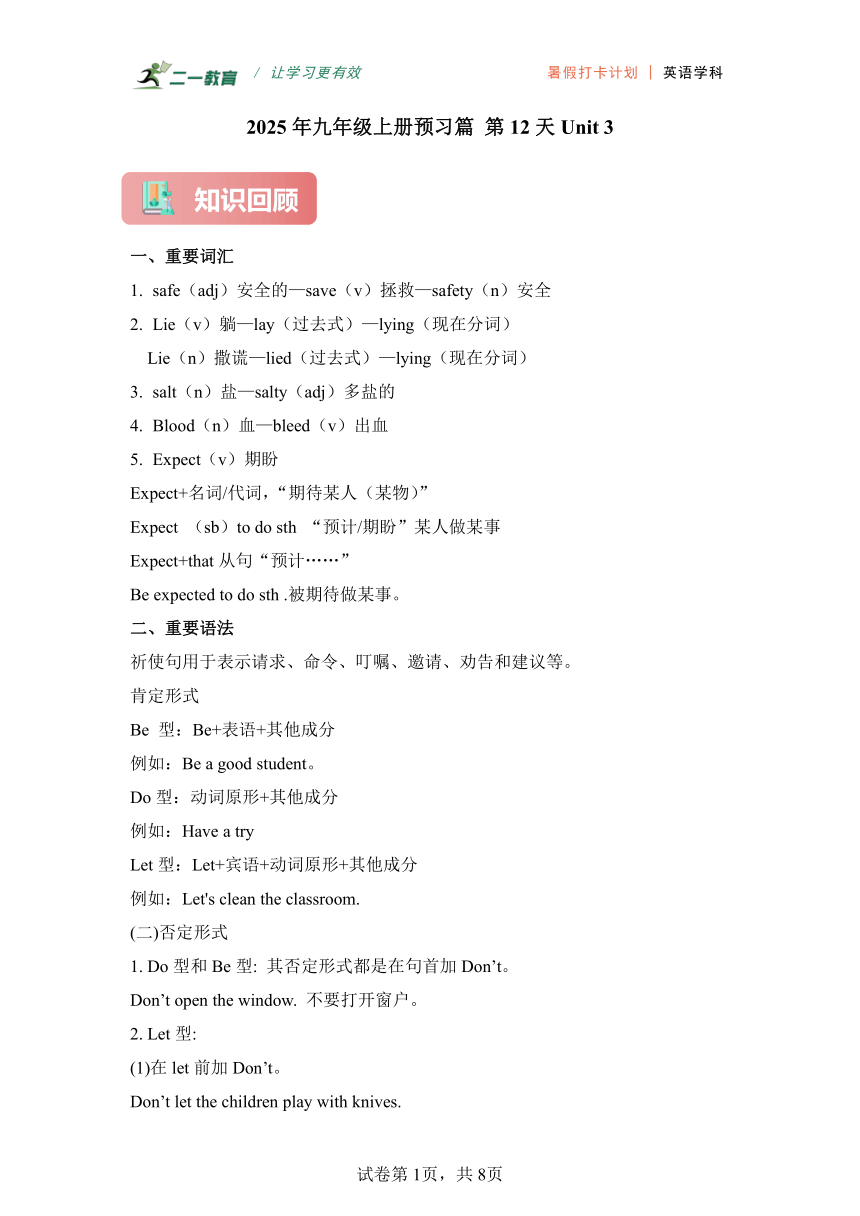
/ 让学习更有效 暑假打卡计划 | 英语学科 2025年九年级上册预习篇 第12天Unit 3 重要词汇 safe(adj)安全的—save(v)拯救—safety(n)安全 Lie(v)躺—lay(过去式)—lying(现在分词) Lie(n)撒谎—lied(过去式)—lying(现在分词) salt(n)盐—salty(adj)多盐的 Blood(n)�———bleed(v)出血 Expect(v)期盼 Expect+名词/代词,“期待某人(某物)” Expect (sb)to do sth “预计/期盼”某人做某事 Expect+that从句“预计……” Be expected to do sth .被期待做某事。 二、重要语法 祈使句用于表示请求、命令、叮嘱、邀请、劝告和建议等。 肯定形式 Be 型:Be+表语+其他成分 例如:Be a good student。 Do型:动词原形+其他成分 例如:Have a try Let型:Let+宾语+动词原形+其他成分 例如:Let's clean the classroom. (二)否定形式 1. Do型和Be型: 其否定形式都是在句首加Don’t。 Don’t open the window. 不要打开窗户。 2. Let型: (1)在let前加Don’t。 Don’t let the children play with knives. 不要让小孩玩刀子。 (2)用“Let sb. +not+ 动词原形”结构。 Let him not sing in the classroom. 让他不要在教室里唱歌。 3. Never型: (1)Never+动词原形。表示劝告, 意为“不要……”。 Never swim in the river. 绝不要在河里游泳。 (2)Never/No+名词/动名词+其他。多用于公共场合的警示语, 意为“禁止……”。 Never parking here. 这儿禁止停车。 (三)祈使句的反意疑问句形式 1. 一般由will you/won’t you构成反意疑问句。 Don’t tell anyone about it, will you 不要告诉任何人这件事, 好吗 2. Let’s的反意疑问句用shall we; 而Let us/me的反意疑问句用will you或won’t you。 Let’s go to the park tomorrow, shall we 我们明天去公园, 好吗 (四)祈使句常用的两个重要句型 1. “祈使句+and+表结果的陈述句”用来叙述肯定的条件。 Hurry up and you will catch the train. 快点, 你会赶上火车的。 2. “祈使句+or+表结果的陈述句”用来叙述否定的条件, or表示“否则, 要不然”。 Hurry up, or you will miss the train. 快点, 否则你会错过火车的。 一、单项选择 1.—You look sad. What happened — Everyone _____ us to win the match, but we lost. A.expects B.expected C.hopes D.hoped 2.The boy _____ that he had seen a cock(公鸡) _____ eggs. A.lay; lie B.lied; lie C.lied; lay D.laid; lay 3.—Mary is _____ about what she eats. She never has junk food. —A good habit. A.careful B.angry C.nervous D.relaxed 4.Because of pollution, not _____ is leaving the Earth. A.enough light B.enough heat C.hot enough D.cold enough 5.David’s grandparents started to learn English three years ago and now they can express _____ well in English. A.them B.their C.theirs D.themselves 6.Just now a young man (lie) on his back on the floor, kicking his legs in the air. 二、单词拼写 7.My daughter e to come home next week. 8.The Huanghe River has a lot of b . 9.Don’t worry about the children. They are old enough to look after t . 10.I can’t stand the earrings she wears because they are really u . 11.Sorry, I don’t know the way you ask. I am a s here. 12.For your own (safe), please don’t smoke inside the plane. 三、适当形式填空 13.She always cared about others. She was one of the most (care) people I’ve ever met. 14.The hall is beautifully decorated with many lights ... ...
~~ 您好,已阅读到文档的结尾了 ~~